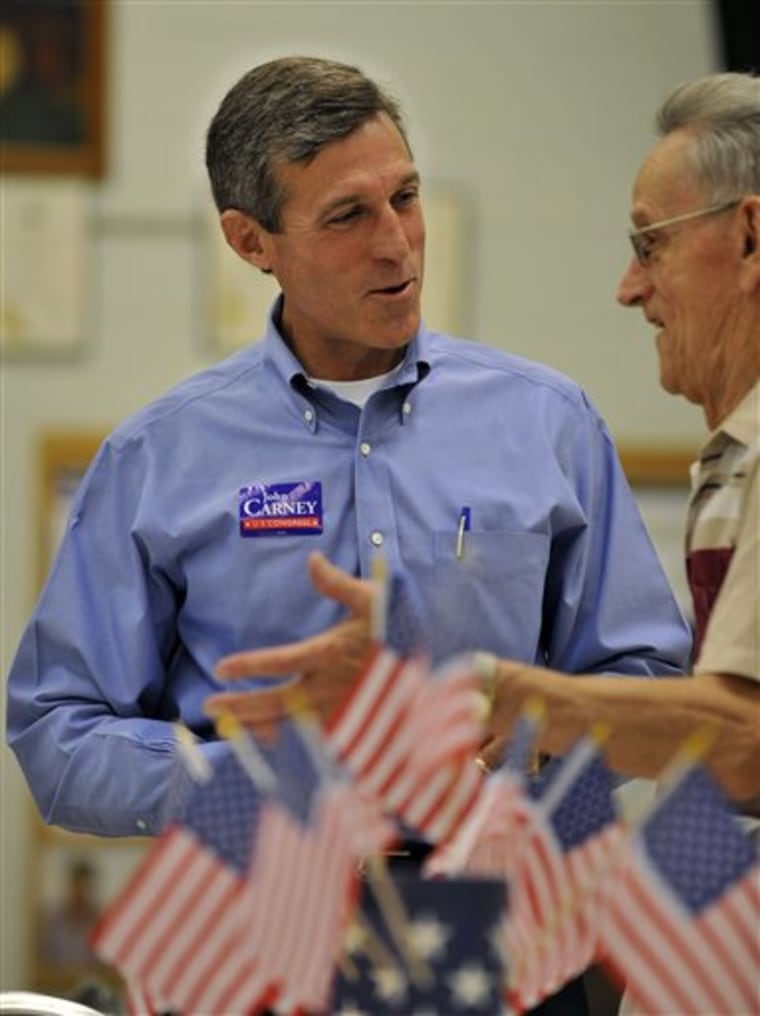John Carney of Delaware is a rarity in a campaign season of foreboding for Democrats, a practicing politician with a strong chance of winning a Republican-held seat in Congress.
Not that Carney is interested in attaching any national significance to his race. "I'll support (President Barack Obama) when I think he's right and I won't when I think he proposes something that isn't in the best interests of Delaware," he says.
But with House Republicans on offense in dozens of races in all regions of the country, victories by Carney and a few others challenging for GOP-held seats — most prominently in Louisiana, Hawaii and Illinois — could amount to a last line of defense for Democrats in their struggle to maintain a majority.
After picking up 55 seats combined in the last two elections, "there was less territory to move into. But we were determined to maximize whatever opportunities there were on offense," said Rep. Chris Van Hollen, D-Md., chairman of the House campaign committee.
"That was something that did not happen in 1994," he added, referring to the last time the Republicans won control of the House.
Republicans must gain 40 seats this fall to capture the House majority, and a struggling economy coupled with strong voter dissatisfaction gives them numerous targets to achieve their goal.
They don't dispute that a few of their own are at risk but say the national trend is moving inexorably their way.
"By October the Democrats are going to realize they have more defensive places" than now appears, and less money to go after GOP-held seats, predicted Guy Harrison, executive director of the National Republican Congressional Committee.
In Delaware, Harrison said, the party-preferred contender, Michele Rollins, "has a very good shot in what frankly for us is a tough state to run in." The primary is Sept. 14.
To understand why Carney, 54, has a chance to take away a GOP-held seat is also to understand why there are so few races like his.
Most important was the decision by nine-term Republican Rep. Mike Castle to give up his seat and run for the Senate, although other factors are working in the Democrat's favor.
Unemployment in the state was 8.4 percent in July, a full percentage point below the national average, and has declined each month since March. As Vice President Joe Biden's home state, Delaware is also on a dwindling list of those where polls show a plurality views Obama favorably rather than unfavorably.
Democrats enjoy a huge advantage in voter registration in the state, which has only one congressional district. Forty-seven percent are Democrats, 29 percent Republicans and 23 independent.
Nor is there significant evidence yet that political experience — which has proved toxic in other states — is viewed negatively by large portions of the Delaware electorate. A two-time lieutenant governor who lost a gubernatorial primary in 2008, Carney is regarded as the favorite against either Rollins or her primary rival, businessman Glen Urquhart.
Additionally, "the Republican primary is working to his advantage" by pushing the contenders to the right, said Gov. Jack Markell, a Democrat who outpolled Carney in a primary two years ago.
Among the other top Democratic target seats, Republican Reps. Joseph Cao in Louisiana and Charles Djou in Hawaii hold office in areas that generally favor Democrats overwhelmingly. In Illinois, the party hopes to win the seat Rep. Mark Kirk is giving up to run for the Senate.
Rollins, a 65-year-old wealthy Delaware businesswoman, is a first-time candidate who is backed by the GOP establishment and runs ahead of Urquhart in private polls. In an interview, she said she decided to run as a reaction to Obama's health care bill, which she opposes, and says, "For me, this election is very much about the free enterprise system. ... Jobs are the issue, the economy is the issue. Who ever heard of hundreds of trillions of dollars in debt?"
But she has yet to launch a sustained television advertising effort to introduce herself to the voters, and the challenge from Urquhart has prevented her from pivoting quickly to a fall campaign against the better-known Carney.
Her political predicament was clear one recent night at a town hall-style meeting in a sparsely furnished room at the Hockessin fire station where Republican candidates for the House and Senate were invited to speak.
A few moments after she said she wanted to repeal the health care legislation that Obama won from the Democratic-controlled Congress, Urquhart accused her of flip-flopping. "When did you decide to change your mind and follow my lead?" he challenged her.
She was on her feet quickly, referring her rival to an earlier event they had both attended where the issue came up. "I wish you remembered, Glen. Maybe you weren't listening," she bristled.
By contrast, Carney glides unopposed toward the Sept. 14 primary, pointing toward the short, seven-week general election campaign that will follow.
"It's all about jobs and the economy," he says of the race.
He lists the plant closures in the state in the past year or so: an Avon products facility, a General Motors factory, a Chrysler plant and a Valero gasoline refinery, and says there is an underlying anxiety about the economy despite recent improvement in unemployment.
In an interview, he said he favors steps to produce jobs immediately, as well as prepare the economy for longer-term growth.
As an example, he cited a proposal to construct wind power projects off the Delaware coast, and talks of having the state become home to domestic manufacturers of the turbines needed to run the windmills for other developments as well.
He favors steps to reduce the federal debt but generally avoids specifics, saying, "You've got to have an overall plan."
As for Obama's health care legislation, he says the feature that requires most individuals to purchase coverage "wouldn't have been my approach."
